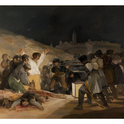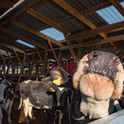Peter Adamson's short story Sahel has won the VS Pritchett Memorial Prize 2013. The award, which has a winner's pot of £1,000, was founded by the Royal Society of Literature and recognises the best unpublished short story of the year.
The day that Kadré has waited for through the long months of the dry season had broken without the usual blinding light. He sits up, and within a second his heart has begun to pound with the weight of all that the day might bring.
He rolls his head to loosen a crick in his neck. Just outside the door a chicken scratches. The sound of pouring water. And something else. The months of morning dryness have gone from his throat. He swallows, pleasurably.
“When will you go?”
His mother has placed a bowl of tamarind water by his mat in silent acknowledgement of anxiety. She is moving around in the shadows of the hut, setting things straight, squaring up his school books, pulling the rush door to one side, letting in the day. The light is opaque, muted, as if seen through a block of salt. He tastes the moisture in the air, pulls the damp into his lungs.
“Straight away.”
When he has washed he scrapes out the last of the porridge, pushing in sauce with a shard. She hands him his shirt, eyes brimming with concern.
Usually, on such a morning, there would be only one topic. For a week the skies above Yatenga had been heavy with promise. And yesterday, towards evening, the first warm drops had spilt over onto the dust of the compound. Soon the whole village had been crouched in doorways, whooping relief from hut to hut in the dusk as the rain, hesitant at first, had begun to insist. "Yel-ka-ye" they had shouted – "no problem" – eyes drinking in the dark blots exploding in the dust, darkening the thatch, patterning the jars outside each door. Later, after the meal had been eaten and the youngest children put to bed, a silence had settled on Samitaba as the adults and elders had returned one by one to squat in their doorways, hypnotised by the rhythm of the rain, awed by the completion of the earth’s slow stain.
But this morning the talk is not of the night’s rains, or of the seeds being sieved from the ashes, or of how many fingers of grain are left on the warm floors of the granaries. This morning the whispers are only of Kadré and his journey to the office of the Préfet.
~
Assita watches her son go, passing between fresh ochre walls and the still dripping thatch. From today, all of their clothes will need more washing. With a heave she lodges the day’s grain on her hip and sets off towards the touré, still watching her son as he makes his way to the road under the eyes of the village. The roofs have been washed, and today the jars will be manoeuvred over the muddy depressions where last night the loose waters splattered heavily onto the earth. All around the familiar sounds of the morning drift across the compound. Firewood being dragged. Water splashing into pots. Utensils being scoured with ash and straw. But all eyes are still on Kadré as he passes the last of the huts and turns towards the road. A few of the women, going about their chores, smile their encouragement. A few of his own age, lacking tact, call out. Assita crosses the broad circle of chaff and peanut shells, already seeing in her mind her son arriving at the edges of the town, crossing the bridge, passing down the muddy main street to the square, climbing the steps to the veranda of the administration building, standing before the list on the notice board, looking to see if his name is one of the ten. She transfers the broad bowl of grain to the other hip. Ten names only. The ten chosen from hundreds, perhaps thousands, from all the schools of Yatenga. The ten who will be leaving their homes and villages. The ten who will be going again to school, only this time many days journey away. From somewhere nearby a donkey brays, dislodging the crows from their nests. Outside the schoolroom, under the remaining neem tree, an old blackboard long ingrained with chalk has been given new life by the night’s rains. Ten who will go to live in the city. Where they have no family. Where they will know and be known by no-one. She bows her head in acknowledgement of the elder coming in the opposite direction along the path. Ten who will wear a tie by day and sleep in a bed by night. The elder looks straight ahead but raises a flat palm. A pair of pliers hangs from his neck, in case of thorns. Ten who will learn about the world, learn to speak in French, maybe even go to Paris. She sets the bowl down by the great mortar, hewn from the trunk of a tree longer ago than anyone can remember. Such things had been known. In the years before the rains failed for the first time there had been a boy from Koudougu, the village where the well was so deep the water was drawn by men. He had found his name on the list and gone to school in the capital. She steps through the rough carpet of straw, husk, and chaff among which the goats and chickens can always find something else to eat. It was rumoured that he had become a man. That he had gone to Paris. Chickens scatter at her feet as she reaches for the heaviest of the pestles. He had never returned. “There is nothing for him here.” Her husband’s words, spoken into the darkness as they had lain awake listening to the rains, had disturbed her. That, and the onset of the planting time. “There is nothing for him here.” Soon the pestle is flying before her face, thudding into the bowl to the dull rhythm of the woman’s drum, jolting the beads of grain from their stalks. Today the seeds will be risked again in the fields. It would have been his twelfth rains. Lassito’s. Her first son. The one who had been born into a parched world, into a colourless land where only the harsh light and dusty shade had defined the shapes of the village. When all across Yatenga - Yense, Kallo, Oufray, Somyaga, Titao – everything had crumbled to the touch. The pestle is sending sprays of white powder into the air as she lowers its rise, easing the muscles of her arms and back. A neighbour passes, heading for the well, and Assita throws the pestle higher, missing a beat and clapping her hands in greeting before catching it again, keeping the rhythm going. When the rains had finally come they had been the first in two years. And they had come too late. "Yel ka-ye," the people had said – "no problem". "Yel Ka-be," they had smiled – "no complaints". Until finally, when even the red millet had gone and the roots were being boiled, the time had come for the infants to be given back. She scoops up the loose grain into the first bowl. From a nearby hut a child cries and is silenced at the breast. Above the touré, a jay has launched itself from a bare tree. She had taken Lassito to the clinic, stayed with him there, listening to the rain drumming its fingers on the iron roof. But when she had brought him home there had been no food. And she had had no milk. "Laafi Bala," the elders had said – "I have peace and health". And they were all starving. She lifts the bowl high and tips the freed grain in a long graceful pour, allowing the faintest of breezes to carry away the straw and chaff to the waiting goats, leaving the hard kernels to rattle accurately into the calabash at her feet, feeling the new touch of the air, the cool and the damp on her skin. It had been just such a morning, fresh and raw, when Hamadé had come to her, carrying the child as a woman does, close to his body. And she had laughed. A man does not carry a child this way. Laughed. Pushing its meaning away. Until it had sunk in that her son was cold against her husband’s chest. Soon the bowl at her feet is full and she begins the second pounding, this time with a grittier thud as the lighter pestle splits the hard backs of the husks to release the tiny white grains; the heart of the matter, the end of the long story that began with the rains and the hoe. “The water is spilt”, the elder women had told her, “but the jar is not broken”. And they had been right. Before the next rains, Kadré had been born. She squats in the shade of the touré, slapping the calabash from hand to hand to the rhythm of another of the dances of her life, working the stubborn husks to the edges of the bowl – slap, tilt, slap – losing them to the waiting earth. “There is nothing for him here.”~
The men have been out in the fields since daybreak, taking advantage of the minutes when the earth is still soft and the air still cool. Across the scarcely perceptible slopes and hollows, groups of figures are bent over the land, blades rising and falling in the sun. Occasionally, a cry of encouragement - ‘Wa t’d maare’ – ‘let us work’ – carries over the land. The rains have come, and the earth is raw and red and greedy.
Hamadé straightens at the end of a row, resting the daba on its blade, surveying the earth he has turned, calculating how much has been done, how much there is still to do. No fence tells him where a field ends and another begins; one man’s plot starts where the earth dips … and ends at the broad pool of thin clay that has formed like a skin over the earth; another man’s starts at the line of termite hills and finishes at that invisible, meandering line between soil and sand, earth and shale, a dividing line of judgement between fertility and barrenness, a fence of decisions that say "beyond here labour is in vain". For a few moments he watches his son on the road below. On any other day the boy would have been by his side, daba rising and falling in time with his own. His action would not have been as practised, as economical, but he would have refused to straighten his back until his father stopped to rest at the end of a row. A cart has stopped to offer the boy a lift as far as the crossroads. Hamadé picks up the daba. Already the tired pallor of the land is returning, the rich colours of the morning drying to a drowsy sameness across the land. All that is different, all that is new, comes from where Kadré is going. From the town. From abroad. The place of diesel engines, dust-stirring motor bikes, steel ploughs and chains, sodium lights and television, Coke and Fanta and yellow beer, razors and zips and baseball bats and brushes for teeth. In all of Hamadé’s gaze, the only alien colour is the blue plastic fertiliser bag, split and stretched over poles to make a place of shade in the fields. All else is the colour of the earth, dark with damp or already light with the drying sun. But earth just the same. The earth from which nothing new ever comes; only the meagre grain and the sun-hardened clay, the tamarind seed and the memories of old men. The land of his grandfather’s time, and of his own father’s memories, has gone. And with it the rich openings of new soil cut or burnt into forest and savannah, the festivals and full granaries. Around him the slopes of Yatenga, cleansed of the tiring dust, glisten threateningly under the sun. But here at his feet, the land that yesterday would have answered the hoe with nothing more than a cloud of dust can this morning be turned and planted. He bends again to his fields, setting up the rhythm that will carry him to the end of a row. Cut and turn. Cut and turn. Three months, four at the most, in which to replenish the granaries. Cut and turn. He starts another row, breaking a new edge of soil. Cut and turn. Salt and spices you can buy with money. Neer and karite you can buy with money. Cut and turn. Cut and turn. But grain you grow with your own hands. Enough to make the sesuka, the welding between one harvest and the next. Cut and turn. Cut and turn. He reaches the top of the first field. The boy has gone and the cart is heading in the opposite direction, towards Oufray. The morning is growing old. And soon all living things will walk, crawl or fly from under the weight of the sun; the elders will be finding shade under the eaves, the chickens fussing beneath the granaries, the goats penning themselves up in the strips of shade under the village walls. Even the brilliant beetle, the wife of the rain, seen only when the soil is wet, will have vanished again into the dark cracks of the earth. He begins a new field, but soon the sound of the blade changes, biting now into shale and sand. It is the sound of half full granaries, the sound of failure. The sound of why the land glistens. The sound of why the joining of the seasons will not be made. He abandons the furrow and finds a new patch further down the same slope. But the soil here is thinner than the blade’s bite and there is nothing to hold the rains. No depth. No root. Instead the night’s downpours send sudden streams scouring the land, earth enriching water, leaving behind only a brittleness so that when the Harmattan begins to blow any soil that is left will fly to the West, as loose as chaff in the winnowing. This is the waré, the quarrel of earth and sky. He tries again, further up the slope, behind the shin-high stones arranged in broad arrows up the slight incline. Others have left firewood out on the slopes to dry, or the dung of goats and sheep, even the droppings of chickens and scraps of cardboard. Anything to try to hold onto the soil of Yatenga. He looks again down the slopes towards the road to the town. In the wrinkles of his feet and ankles the mud has dried to a fine clay. It is Ramadan, and he will not eat until sundown.~
Kadré arrives at the edge of town, passing between the barracks and the municipal dump. Below the bridge, the river is only a bed of mud in which cattle have left deep, oozy hoof prints. Lizards scuttle from his path as he walks down the wide street. Everything familiar is made different by the night’s rain. As if each low cement building, each water tower, each radio mast, has taken on some new edge of reality. He is nearing the administration building. The walk from Samitaba has been the same, an easy distance that he has covered a thousand times to school, yet on this morning his breathing is tight and his skin feels stretched across his chest. He passes the grain store, the entrance littered with cycles and iron-handled carts. From the darkness inside comes the sweet, musty smell of sacking and grain. He is about to raise his hand to the foreman who does not see him; the hand goes instead to the pen in his shirt pocket. Outside the depot a line of new ploughs stands waiting for customers, their naked prows pointing to an invisible future. He stoops to check the label on one of the handles: "Drome, France, approprié à tous les sols". He straightens again, and the sun flashes like fear on the bare steel of the blades. And now his heart is pounding with the insistent coughing of the diesel engine as he approaches the mill, passing between empty carts and oil drums. On the corrugated roof a makeshift exhaust pipe thuds dirty air into the sky. He hurries past, counting the line of enamel bowls at the feet of the miller. A shout draws his eyes across the street to where a group of men, sitting in the shade, are throwing stones at a goat nibbling at a few vegetables sticking out from the pannier of a motorbike. The men return to smoking and playing cards. A younger man observes them, sitting astride a 250 cc Yamaha, a traditional hunting knife bound to the forks with a leather thong. He enters the broad municipal square. Newly planted trees, fenced against the wandering goats, form an inner quadrangle of acacia, neem, zanga. Behind the trees, on the south side of the square, are the offices of the Préfet. Outside, a battered white Peugeot stands in a strip of shade. He climbs the five wooden steps to the veranda. On his left, a line of latticed doors give access to the district outposts of various ministries. Through the first of the doors comes the slow clack of a typewriter. Just beyond the flagpole he can see the doorway and further along the notice board protected by its wire cage. Inside the cage he can already see a fresh white sheet pinned on top of yellowing bye-laws and curled election notices. Inside the open doorway, the threatening swoop of a ceiling fan.~
Assita’s lower back is aching as she comes to the end of the last row, finger and thumb rolling seeds over the edge of the calabash, her eyes scanning the road in the direction of town. Hardly pausing, she moves down the furrow, scraping a bare foot over the seeds she has planted, pressing them gently into the earth. If the rains hesitate, even for a week, the new seed will be wasted, the tender shoots tortured and sere, fit only for the goats. Every morning now will see anxious eyes cast to the skies. At the entrance to the compound the other boys are shouting and laughing, lighting handfuls of straw as they advance on the termite hills that line the road. At first he is only a speck. But she would know his walk anywhere, and hurries to finish the row. There is water to collect, the fire to start, food to prepare. Some of the boys have surrounded the largest of the mounds, waving hands of fire, encouraging the termites that fill the evening air to fly into the flames. Is there a lightness in his step? Later, when enough of the insects have fallen to the earth on frizzled wings, there will be more shouting and laughter as they try their hand at winnowing, pouring the singed insects into bowls at their feet, hoping that imperceptible movements of air will blow away the legs and wings. Or is there a weight in his heart? A neighbour, smiling, motions to her to take the jar she has just filled. Assita thanks her and lifts the pot onto a bent knee while her hand scrapes the mud from its base. She slips a coil on top of her head and lifts the jar high, moving swiftly under its weight, straightening her knees and back. She pauses a moment, lets her arms fall to her side, steadies the muscles of her neck, hears the faint snap of a swallow’s beak as it takes an insect low over the well.~
Mohammed, elder of elders, eyes glinting, hands resting calmly in the lap of his robe, watches as Kadré approaches the first hut of the compound. The boy bows his head as he passes. A boy who shows respect. A boy who knows how to conduct himself. He follows his progress through the village, observing the glances of neighbours and the way the young man’s eyes remain fixed on his own quarter of the compound. Slowly the old man raises a hand to finger the lines carved down his face, cut there earlier than he can remember, in the time when the rains had never failed. Lines of identity. Lines of protection. Lines that once guaranteed hospitality across the lands of the Mossi. He turns his head away as an older youth passes by, carelessly kicking a used battery, scattering earth, ignoring the old man in the shade. Respect that is dying. Dying like the land. He lifts his head again and runs the fingers of one hand inside the leather thongs that bind the strips of tyre to his feet. It is many hours since any water was set down by his side. He swallows and closes his eyes. Growing old should be an upward as well as a downward journey. For the slackening of muscle and the stiffening of bones, for the loss of teeth and hair, for the sadness of failed hopes, for the realisation of time past grown long and time to come grown short - for all this compensation is due. In respect. In standing. In the place you have earned in your village. But only in the dying world is it still true. In the world being born, respect is for those who can ride motorbikes and buy what others do not have. He opens his eyes to the late afternoon sun. To a world built to sharpen the edges of age, where wisdom and usefulness are no more, where all that awaits is pity and tolerance, fading finally to impatience, resentment. Dying like the land. Very softly, rain is beginning to fall in heavy drops on the thatch. He has heard that floods have collapsed the well at Oufray, and taken away a part of the road.~
Assita and Hamadé sit on either side of their son in the doorway of the hut, listening to the hard rhythm of the rain and the undisciplined splatter of the overflow from the gutters. In the compound, the water is running in rivers down mud walls, picking out pieces of gravel, exposing the ends of straws, sluicing through the fence that for months has protected a small shrub. In the distance, the first soft far-off lightning plays around the edges of the sky. Eventually, Hamadé, who never touches his son, rests a hand on the boy’s shoulder. “The elder of elders came to see me.” Kadré looks up. “Here?” Hamadé’s hand grips. “He came to offer me his congratulations. For my son.” Kadré swallows and looks down again at the open space in front of the hut. The shallow thirst of the earth is already slaked and reddening pools are swirling under the granaries. Near the wall of the compound, a water-bucket made from the inner-tube of a tyre is floating slowly across level ground. “Why did he come?” Hamadé releases his touch on the boy’s shoulder. A touch that will stay with Kadré all of his life. “He watched you when you came back through the village. He said you carried your disappointment well. He said you bore it like a man.”~
Later, when Assita and Kadré are asleep, Hamadé returns to his doorway. This morning, as he had reached his hands into the sweet-smelling belly of the granary for the day’s grain, he had felt the bare boards of the floor under his knuckles. This year again, the joining of the seasons will not be made. And he will know the shame of buying grain. In the fields outside the compound, water from all directions will be swirling down faint inclines, flooding every hollow, pouring into troubled pools and surging in broad, white-flecked streams across the countryside. There is enough money for two sacks, perhaps three. After that, he will have to make the journey to the coast to find work. A thousand miles. And this time he will take Kadré with him. Under the open night, in the porous rock under the thin soils of Yatenga, the rain is seething through a thousand cracks and fissures, swirling along the centuries of smoothed galleries, pouring down streams and hidden waterfalls to deposit itself into the dark safes of water under the Sahel. But tonight not even the parched earth can drink enough, and the rejected waters turn away, a restless reddening tide, looking for escape. In its path, the leafless shrub finds itself marooned inside its fence. For months it has survived the white sun and been protected from the marauding goats. Hamadé watches its stem rupturing the water’s flow, bending before the angry ripple at its base. But the tide, unappeased, is seducing soil from around the slender shoot and slowly, lasciviously, the tender whiteness of the young tree’s root is revealed. And in an instant, the shrub is gone, persuaded out of the ground, lifted as painlessly as a child’s tooth. A second later, the little binding of earth, freed from the grip of roots, follows after, a small clot in the haemorrhaging blood of the land, swept away to the sudden streams and rivers carrying the soil south to the coast and the cold waters of the sea.












